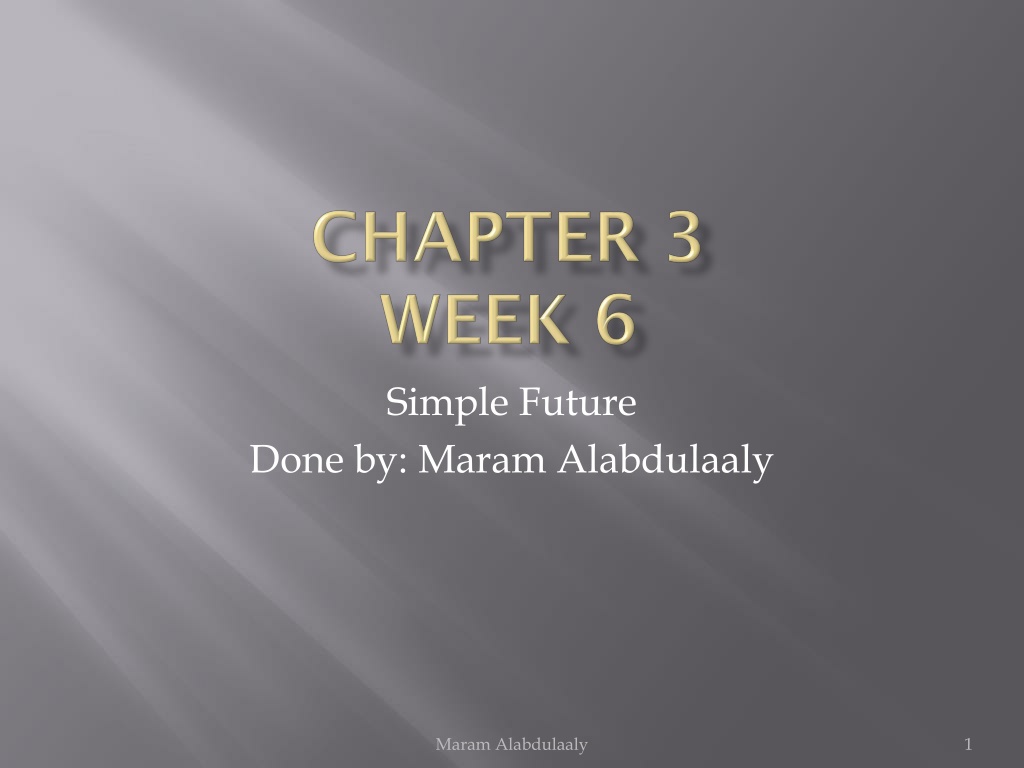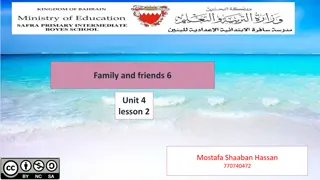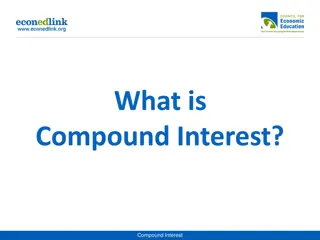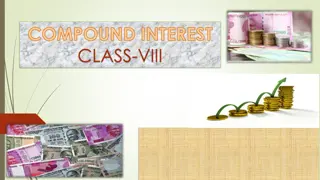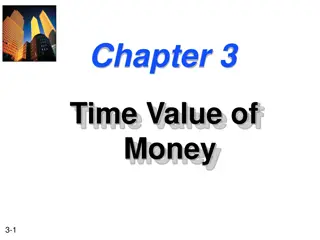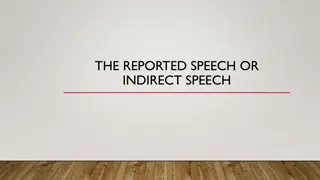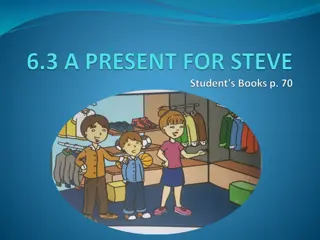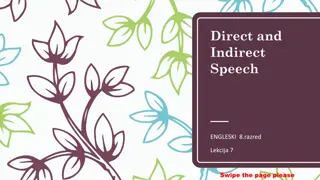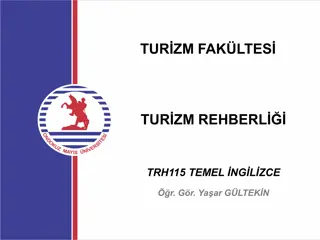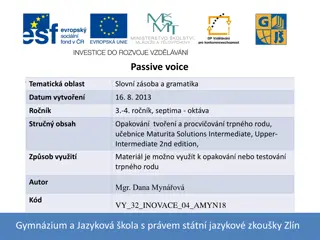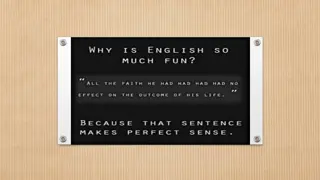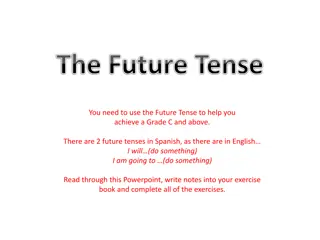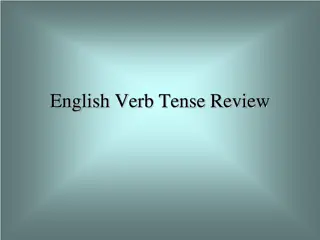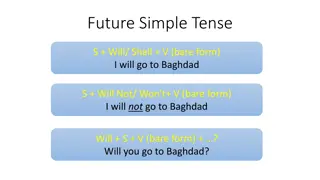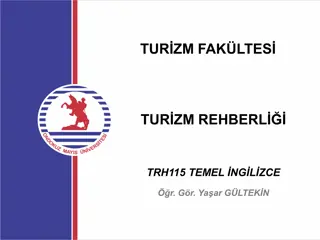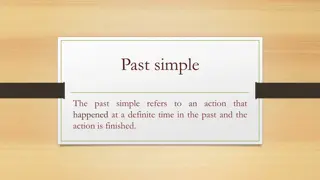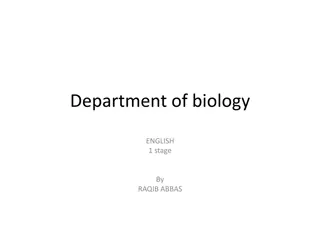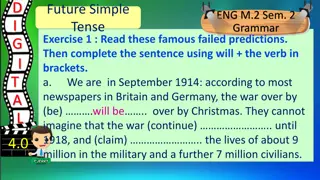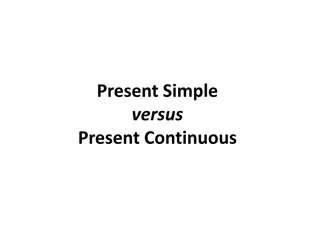Understanding Simple Future Tense in English Grammar
Simple Future Tense is used to express actions that will happen in the future. It is formed using "will" or "be going to" and can also involve expressions like "shall." This tense is used for predictions, plans, willingness, and decisions made at the moment of speaking. Learn how to form affirmative and negative sentences, ask questions, and use time expressions in the simple future tense.
Download Presentation

Please find below an Image/Link to download the presentation.
The content on the website is provided AS IS for your information and personal use only. It may not be sold, licensed, or shared on other websites without obtaining consent from the author. Download presentation by click this link. If you encounter any issues during the download, it is possible that the publisher has removed the file from their server.
E N D
Presentation Transcript
Simple Future Done by: Maram Alabdulaaly Maram Alabdulaaly 1
When is the Simple Future tense used? How to we express future time? Will vs. Be Going To: Page 63 Forming Sentences Affirmative statements. Negative statements. Long & contracted forms. Forming Questions Maram Alabdulaaly 2
The simple future tense expresses future time. Future Past Now Maram Alabdulaaly 3
Sometimes we use I/we + shall +v- simple form to express future. Examples: I shall go to work tomorrow. We shall eat lunch at 3:00 PM. We mostly express future using: will or be (is-am-are) going to . We also use the simple present and present progressive in some cases. Maram Alabdulaaly 4
Sometimes they can both be used, like in prediction, while in other cases only one is suitable. Will It will rain tomorrow. Prediction Be going to It is going to rain tomorrow. Prior Plan Be going to I m going to give you quizzes. Willingness/ a decision the speaker makes at the moment of speaking. will I will help you open the door. Maram Alabdulaaly 5
The following time expressions can be used to express: Past, Present or Future time. This + morning/afternoon/evening/week ..etc Tonight Today The type of tense depends on the meaning. The weather is nice this morning. (Fact= Simple Present) The weather was nice this morning. (Past) The weather will/is going to be nice this morning. (Future). Maram Alabdulaaly 6
Forming Affirmative sentences. Forming Negative sentences. Page 56 &59 Maram Alabdulaaly 7
Subject Verb The rest of the sentence English grammar. I will/ am going to will/ is going to teach Singular: (Sara, Ahmad.. etc) (He, She, it) Plural: (The boys..etc). (We, you, they) visit in Riyadh. will/ are going to Hard. study Maram Alabdulaaly 8
Long form I will finish my work tomorrow. She will finish her work tomorrow. They will finish their work tomorrow Contracted form I ll finish my work tomorrow. She ll finish her work tomorrow. They ll finish their work tomorrow Long form I am going to finish my work tomorrow. She is going to finish her work tomorrow. They are going to finish their work tomorrow Contracted form I m going to finish my work tomorrow. She s going to finish her work tomorrow. They re going to finish their work tomorrow Maram Alabdulaaly 9
Subject Verb Optional: the rest of the sentence English grammar. I Will not/ am not going to Will not / is not going to teach Singular: (Sara, Ahmad.. etc) (He, She, it) Plural: (The boys..etc). (We, you, they) visit in Riyadh. Will not / are not going to Hard. study Maram Alabdulaaly 10
Long form I will not finish my work tomorrow. She will not finish her work tomorrow. They will not finish their work tomorrow Contracted form I won t finish my work tomorrow. She won t finish her work tomorrow. They won t finish their work tomorrow Long form I am not going to finish my work tomorrow. She is not going to finish her work tomorrow. They are not going to finish their work tomorrow Contracted form I m not going to finish my work tomorrow. She isn t going to finish her work tomorrow. They aren t going to finish their work tomorrow Maram Alabdulaaly 11
Forming questions with yes/no. Forming information questions. P56 & 59 Maram Alabdulaaly 12
Will Subject Verb Optional: the rest of the sentence a day off? here? Will I/you Singular: (Sara, Ahmad.. etc) (He, She, it) Plural: (The boys..etc). (We, you, they) Take Stay do the exercise? Maram Alabdulaaly 13
Be going to Subject Verb Optional: the rest of the sentence a day off? here? am I Singular: (Sara, Ahmad.. etc) (He, She, it) Going to Take Stay Is Plural: (The boys..etc). (We, you, they) do the exercise? Are Maram Alabdulaaly 14
She will 1. Switch the order between the subject and will 2. Add the question mark. Will she leave soon? She is going to leave tomorrow. 1. Switch the order between the subject and the verb be. 2. Add the question mark. Is she going to leave tomorrow? leave soon. Maram Alabdulaaly 15
Subject I Singular: He, She, it Plural: We, you, they Yes, Will. Subject I Singular: He, She, it Plural: We, you, they will not. No, Maram Alabdulaaly 16
P60 Maram Alabdulaaly 17
Use be going to or will if you feel sure about the future: It will rain tomorrow. It is going to rain tomorrow. Maram Alabdulaaly 18
Add probably if you feel 90 % sure about the future with will or be going to: Will: S Will Probably It Will Probably V Rain O tomorrow S It Probably Probably Will Will Not Not V Rain O tomorrow Be going to: S It be is Probably Probably Going to Going to V Rain O tomorrow S It Probably Probably Be is Not not Going to Going to V Rain O tomorrow Maram Alabdulaaly 19
Add may or maybe if you feel 50 % sure about the future: Using May: S It may May V Rain O tomorrow S It may May not not V Rain O tomorrow Using Maybe (at the beginning only): Maybe Maybe S It Will Will (not) V Rain O tomorrow Maybe Maybe S It Be going to Is (not) V Rain O tomorrow Maram Alabdulaaly going to 20
